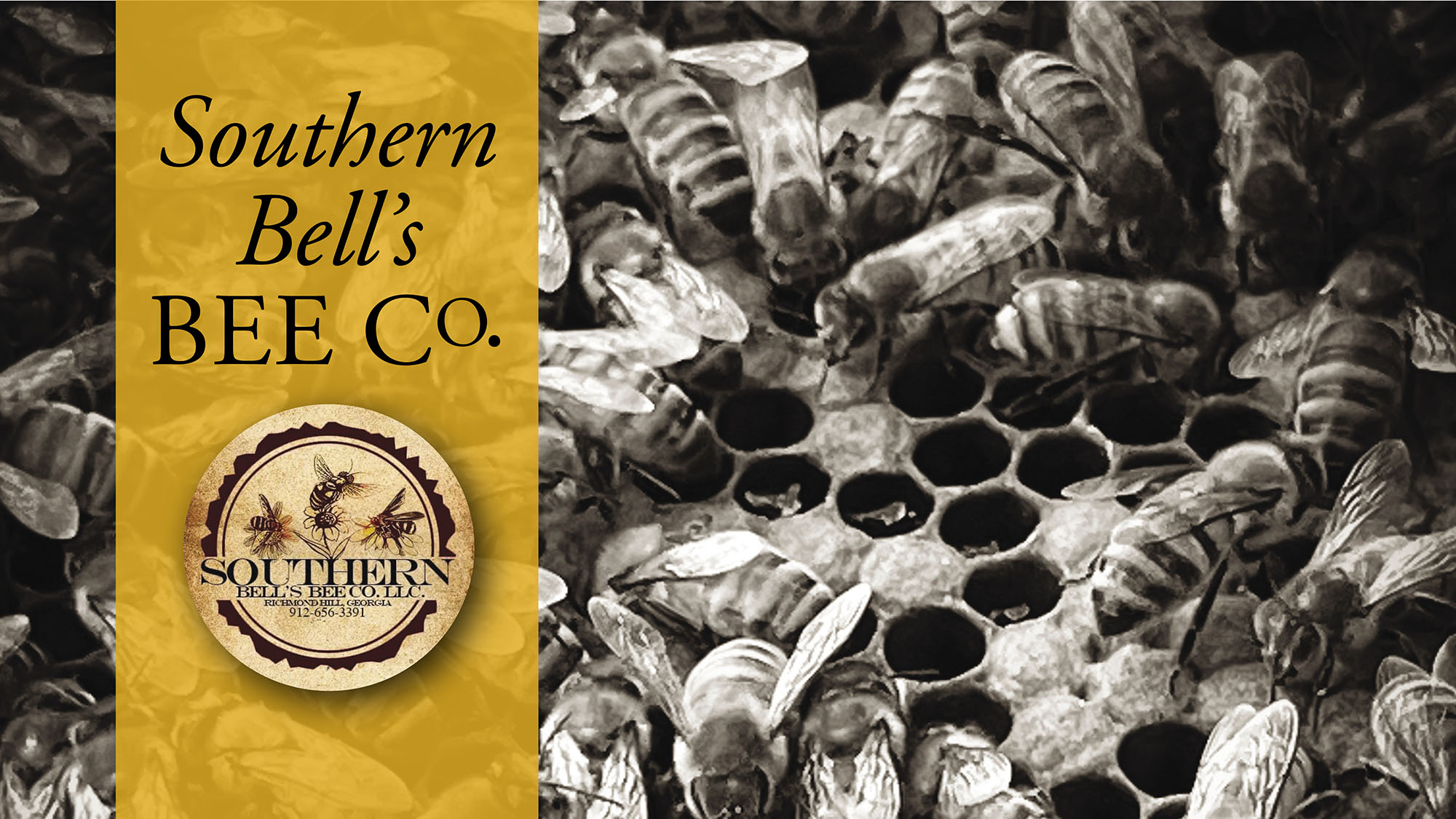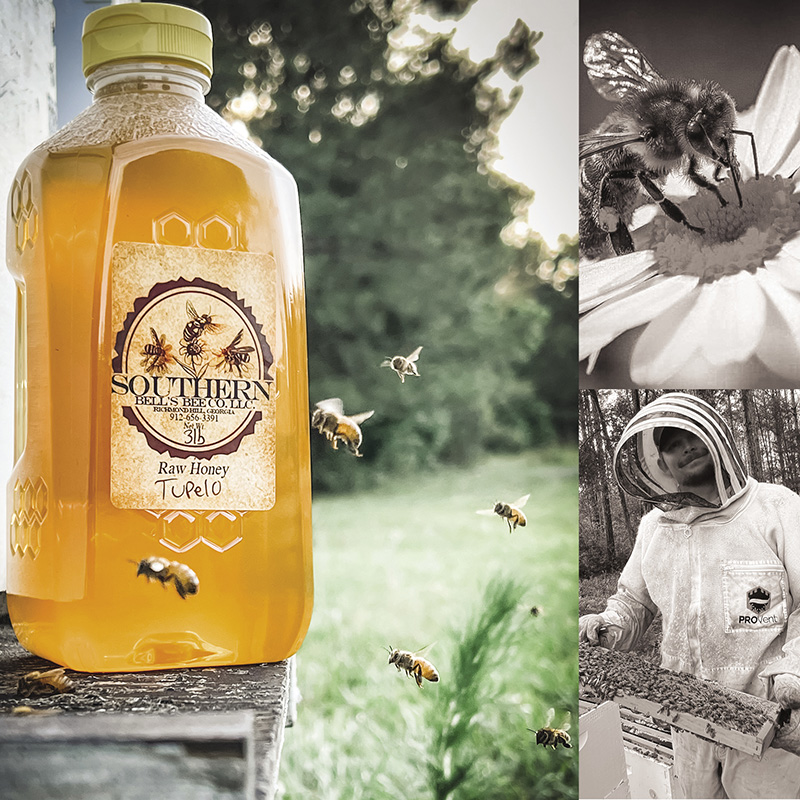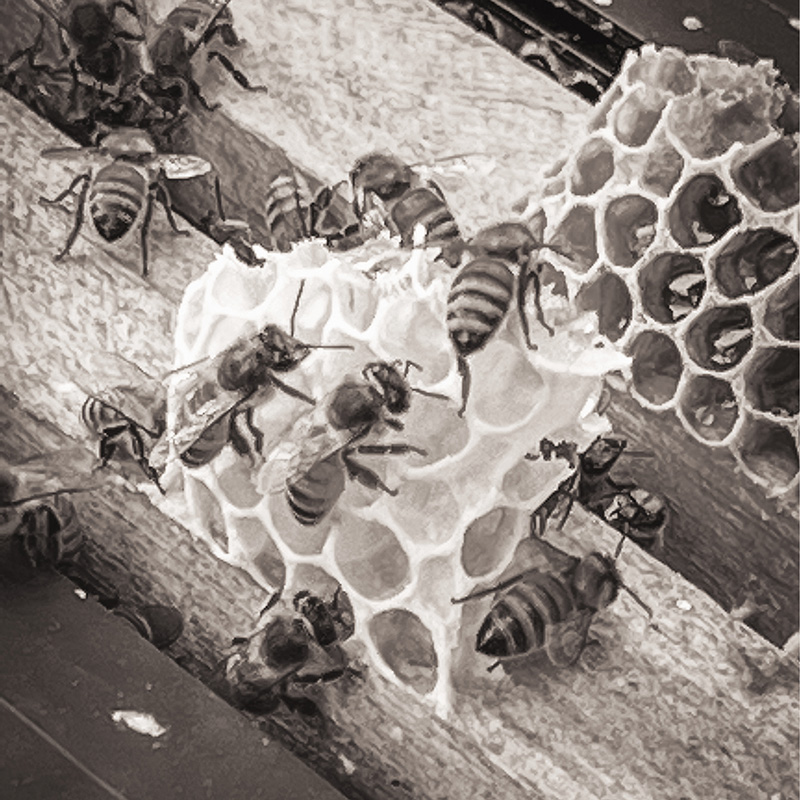
Southern Bell’s Bee Company
WORDS AND PHOTOS BY PAIGE GLAZER
SUMMER 2022

It was ten til six when I left my house. I felt like I was forgetting something in my angst to get out the door to visit the Mike and Ashley Bell’s honeybees. When Mike told me to ‘hop in the truck we were riding to the woods, it hit me. My boots! I forgot to grab my boots. Great! Now I’d have to think about the snakes and the bees getting me. Oh well, I thought to myself, it will just have to be. (No pun intended).
Similar to my first time visiting an apiary with the legendary JM Sikes, we drove to what felt like the end of the earth. Southern Bell’s Bee Company leases agricultural property and the honey bee rights to the land they farm from Rayonier. The area where Mike works his bees borders unadulterated state land out near the old Fisherman’s Co-op. Gorgeous property, tucked away from human activity, thick with palmetto and wild blueberries, the nectar source upon which the bees dine. Mike drew many parallels to farming any crop as he pointed to blooming palmetto and bees working hard alongside the narrow dirt road. Hastily, I asked him to stop for a picture. I hopped right out of the truck and into the brush like I had my boots on, quickly remembering I should probably worry less about the photo and maybe a little more about whose habitat I was now stepping into.
So just how does commercial apiculture work? Much like any commercial farmer, in order to sell honey to a retailer, the beekeeper must be licensed and inspected by the Department of Agriculture. Southern Bell’s Bee Company got their start in 2015 as a hobby with just two nucleus colonies, a nucleus us a small colony with bees of all stages of development. Mike’s wife, Ashley laughs from the back seat, “Mike is known for taking his hobbies to the extreme!”

Mike’s interest in bees began as a child. He credits his appreciation for farming in general to his grandfather who raised him and “grew a little of everything,” selling the fruits of his labor at a local produce stand at the end of the road. The love of bees came in part from watching JM Sikes as a boy. JM kept some of his bees near Mike’s Grandpa’s farm in Fleming. If you ever had the honor of meeting the late Mr. Sikes, you can understand the fascination found in watching him work the woods and listening to his success story.
I learned that in order to make the maximum amount of honey, you have to have your colonies of bees at the right strength at the right time.“There is a lot of management involved in the colony maintenance,” Mike explains. “The idea is to not have to feed them during the winter, so careful attention must be paid to the weather and their honey stores [natural food supply]. And, the bees are not always healthy.” About this time, he says his season has been a good one, noting that he just pulled another 150 gallons of Galberry from the hives the weekend before.
It was time to get out of the truck in the land of palmettos. Lined just beyond where we parked were about 10 bee boxes. Silently, I questioned my shoe choice again, but the possibility of being stung by the loud swarm I could hear over yonder was carrying a little more weight just as Mike says, “I wish you wouldn’t have worn black pants.” I was relieved when he pulled out a full camo jump suit with an attached veil for me to jump into! The temperature immediately rose from cool 88 to stifling 98 degrees, but at least now I could get as close as I wanted to the buzzing monstrosity ahead. Mike started puffing the bee smoker to calm the hive sharing a lesson about bees I’d never been told. “If you ever run into an angry bees, run through the thickest woods you can find and they will go home. If you run in the wide open, they will chase you.” You are all welcome for the note!
“So, my season begins in the Fall,” he said as he removed the top and pulled a frame from the box numbered 22. The number is a management tool Mike uses to keep up with the age of the queen. “I start by making sure their mite loads are low, treating them if necessary.” Did you know the biggest threat to honeybees isn’t we the people, spraying their habitats with chemicals, but is actually a bug call the varroa mite? “If they are too sick, or newly rescued (people call Southern Bell’s to remove unwanted swarms), they go to my quarantine yard so not to jeopardize infecting my healthy producing bees.” Sometimes they require supplementation by their attending farmer— sugar mixed with water to create a syrup weighted in strategic measurements for one reason or another and synthetic pollen are often used to help keep them fed and healthy. I asked Mike if they can make it on their own, to which he replied, “Not really. Between disease and parasites, beekeeping is a necessary art in the sustainability of the honey bee.”

“In late March, the first major nectar flow begins here. That’s what I use to build my colonies that will make Tupelo, Galberry and Palmetto… I move them around to ensure the integrity of the honey. If not, you just end up with an overflow of nectars.” Mike intentionally makes the overflow or wildflower honey to serve those who seek it to remedy their allergies. He tells me a little more about how he’s using beekeeping to teach his boys about farming. “Since they aren’t exactly growing up on a farm like I did, raising bees gives me a chance to share similar experiences— management skills, care, and commitment… Caleb and Levi are getting first hand knowledge.”
Apiculture is quite the fascinating art, and the learning curve is obviously steep for the bee is a fragile species. Somewhere between veterinarian and farmer, is a marketer, production manager, botanist and a logistics specialist. A quick glance into the every day activities at Southern Bell’s Bee Company makes me appreciate the art not only for the delicious buttery honey that tops my toast on Sunday mornings but for what they are doing to benefit their survival, as it directly affects ours. Bees are an essential part of our agriculture, pollinating many fruits, nuts, and vegetables and their health directly impacts our food security. According The Bee Conservancy, they pollinate 1 in 3 bites of the food we eat. and are essential to the health and prosperity of countless ecosystems. After an hour with Mike Bell, it is obvious that the work of a bee keeper is exhausting, protecting his livestock without a fence and operating his farm without a barn— he puts every extra available moment into caring for his colonies.
Find Southern Bell’s Bee Company honey at local farmers markets, Royal Ace Hardware, Ogeechee Meat Market, and on Facebook @bellfamilyrawhoney.



















